
Text c How to Argue
Text C How to Argue
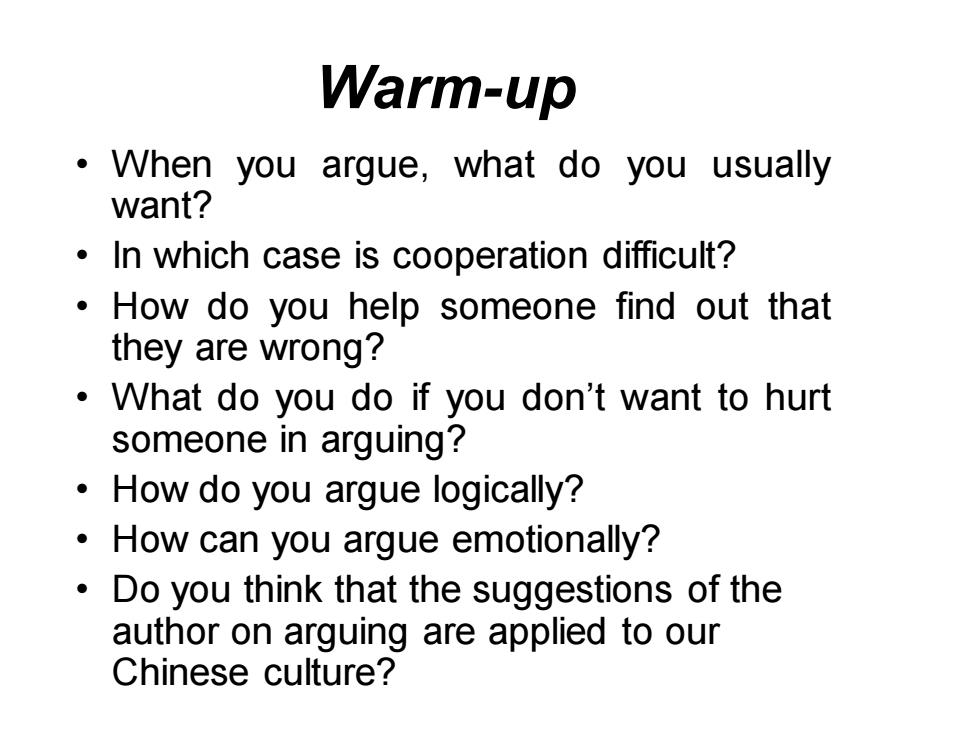
Warm-up When you argue,what do you usually want? In which case is cooperation difficult? How do you help someone find out that they are wrong? What do you do if you don't want to hurt someone in arguing? How do you argue logically? How can you argue emotionally? Do you think that the suggestions of the author on arguing are applied to our Chinese culture?
Warm-up • When you argue, what do you usually want? • In which case is cooperation difficult? • How do you help someone find out that they are wrong? • What do you do if you don’t want to hurt someone in arguing? • How do you argue logically? • How can you argue emotionally? • Do you think that the suggestions of the author on arguing are applied to our Chinese culture?
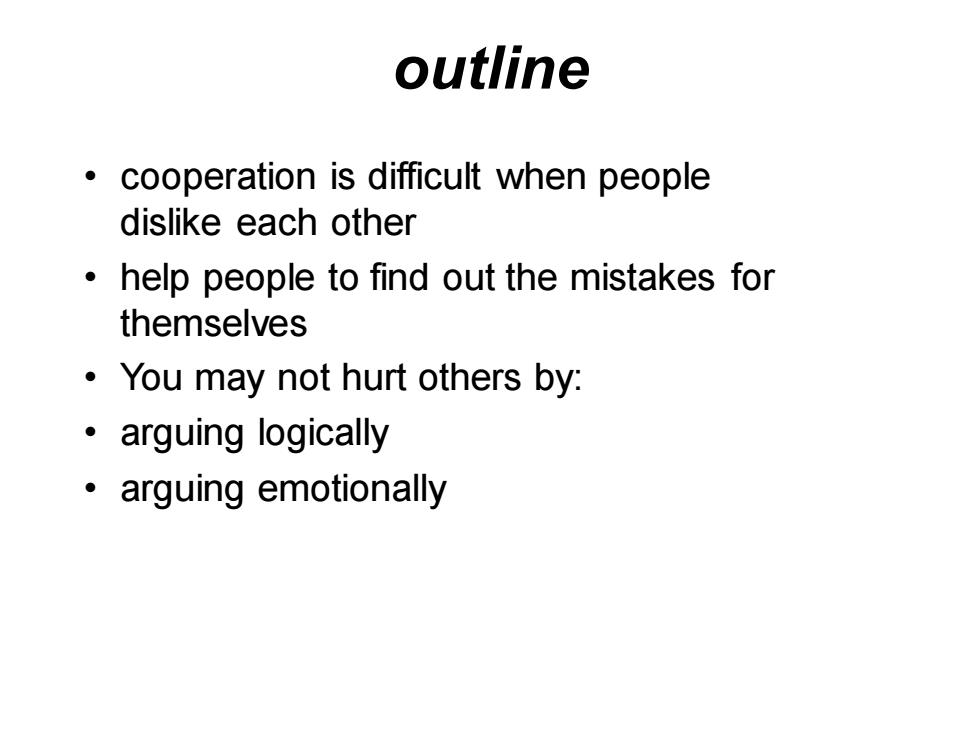
outline cooperation is difficult when people dislike each other help people to find out the mistakes for themselves You may not hurt others by: ·arguing logically ·arguing emotionally
outline • cooperation is difficult when people dislike each other • help people to find out the mistakes for themselves • You may not hurt others by: • arguing logically • arguing emotionally
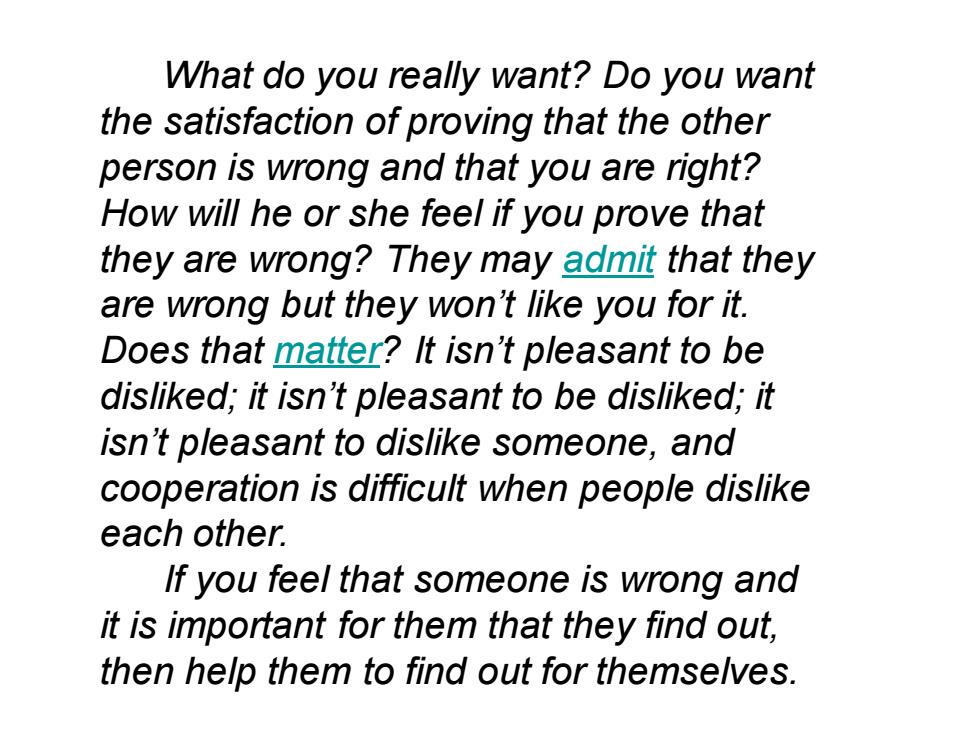
What do you really want?Do you want the satisfaction of proving that the other person is wrong and that you are right? How will he or she feel if you prove that they are wrong?They may admit that they are wrong but they won't like you for it. Does that matter?It isn't pleasant to be disliked;it isn't pleasant to be disliked;it isn't pleasant to dislike someone,and cooperation is difficult when people dislike each other. If you feel that someone is wrong and it is important for them that they find out, then help them to find out for themselves
What do you really want? Do you want the satisfaction of proving that the other person is wrong and that you are right? How will he or she feel if you prove that they are wrong? They may admit that they are wrong but they won’t like you for it. Does that matter? It isn’t pleasant to be disliked; it isn’t pleasant to be disliked; it isn’t pleasant to dislike someone, and cooperation is difficult when people dislike each other. If you feel that someone is wrong and it is important for them that they find out, then help them to find out for themselves
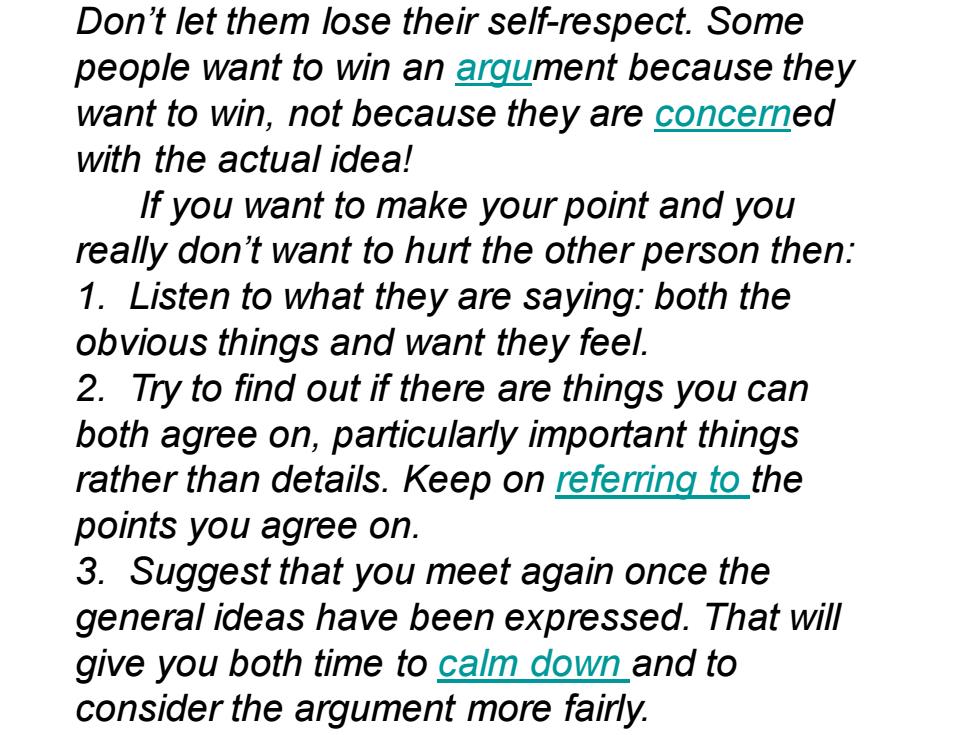
Don't let them lose their self-respect.Some people want to win an argument because they want to win,not because they are concerned with the actual idea! If you want to make your point and you really don't want to hurt the other person then: 1.Listen to what they are saying:both the obvious things and want they feel. 2.Try to find out if there are things you can both agree on,particularly important things rather than details.Keep on referring to the points you agree on. 3.Suggest that you meet again once the general ideas have been expressed.That will give you both time to calm down and to consider the argument more fairly
Don’t let them lose their self-respect. Some people want to win an argument because they want to win, not because they are concerned with the actual idea! If you want to make your point and you really don’t want to hurt the other person then: 1. Listen to what they are saying: both the obvious things and want they feel. 2. Try to find out if there are things you can both agree on, particularly important things rather than details. Keep on referring to the points you agree on. 3. Suggest that you meet again once the general ideas have been expressed. That will give you both time to calm down and to consider the argument more fairly
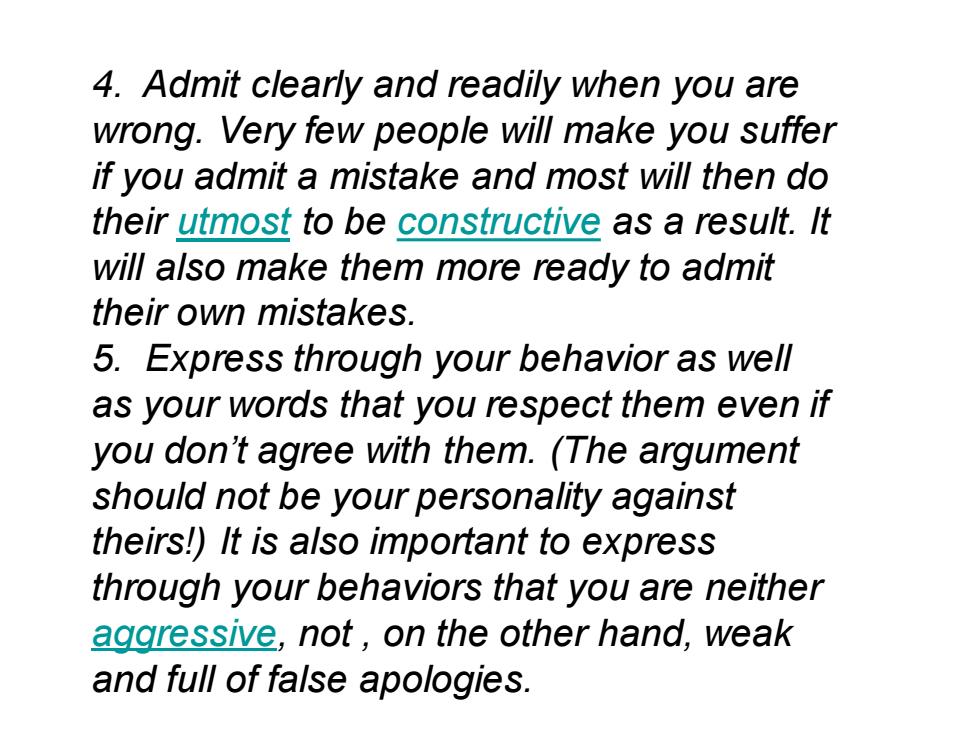
4.Admit clearly and readily when you are wrong.Very few people will make you suffer if you admit a mistake and most will then do their utmost to be constructive as a result.It will also make them more ready to admit their own mistakes. 5.Express through your behavior as well as your words that you respect them even if you don't agree with them.(The argument should not be your personality against theirs!)It is also important to express through your behaviors that you are neither aggressive,not,on the other hand,weak and full of false apologies
4. Admit clearly and readily when you are wrong. Very few people will make you suffer if you admit a mistake and most will then do their utmost to be constructive as a result. It will also make them more ready to admit their own mistakes. 5. Express through your behavior as well as your words that you respect them even if you don’t agree with them. (The argument should not be your personality against theirs!) It is also important to express through your behaviors that you are neither aggressive, not , on the other hand, weak and full of false apologies
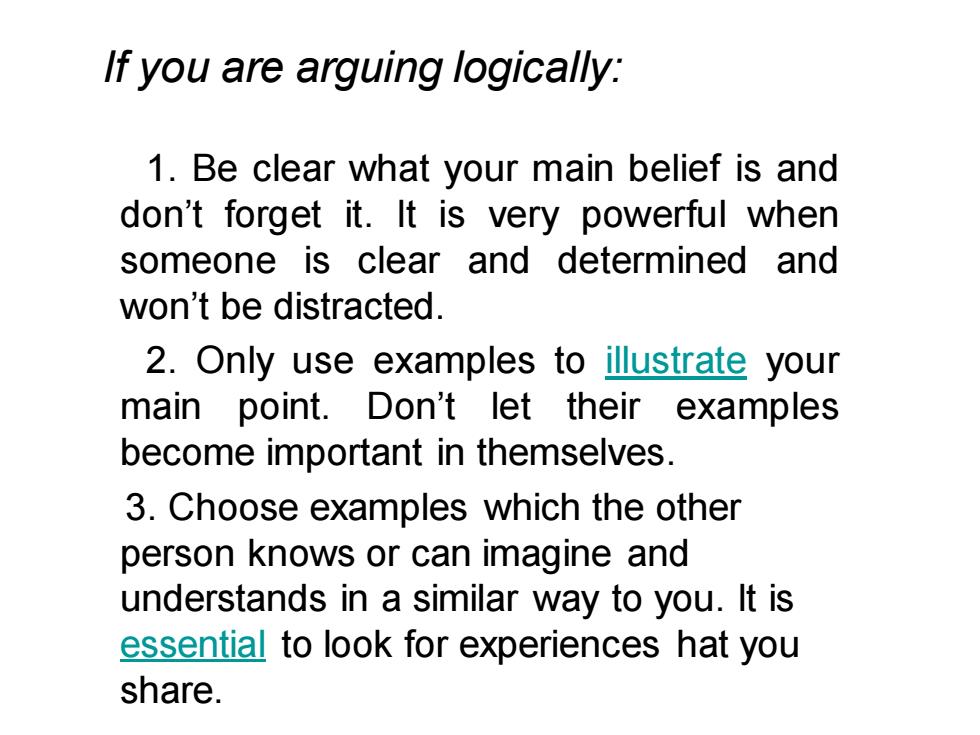
If you are arguing logically: 1.Be clear what your main belief is and don't forget it.It is very powerful when someone is clear and determined and won't be distracted. 2.Only use examples to illustrate your main point.Don't let their examples become important in themselves. 3.Choose examples which the other person knows or can imagine and understands in a similar way to you.It is essential to look for experiences hat you share
If you are arguing logically: 1. Be clear what your main belief is and don’t forget it. It is very powerful when someone is clear and determined and won’t be distracted. 2. Only use examples to illustrate your main point. Don’t let their examples become important in themselves. 3. Choose examples which the other person knows or can imagine and understands in a similar way to you. It is essential to look for experiences hat you share
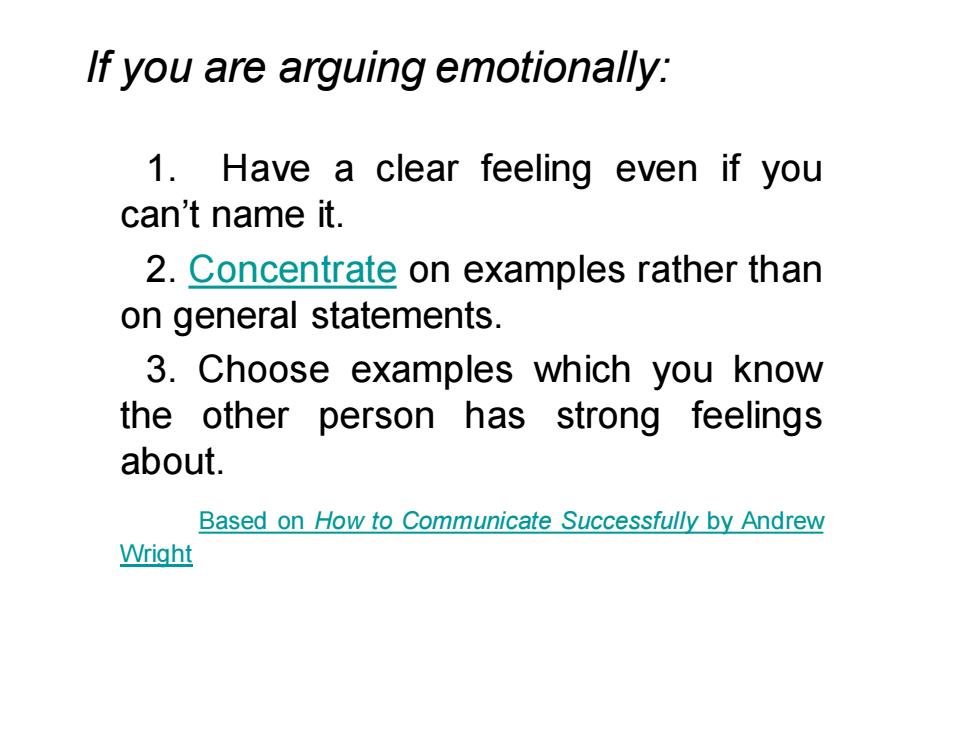
If you are arguing emotionally: 1.Have a clear feeling even if you can't name it. 2.Concentrate on examples rather than on general statements. 3.Choose examples which you know the other person has strong feelings about. Based on How to Communicate Successfully by Andrew Wright
If you are arguing emotionally: 1. Have a clear feeling even if you can’t name it. 2. Concentrate on examples rather than on general statements. 3. Choose examples which you know the other person has strong feelings about. Based on How to Communicate Successfully by Andrew Wright

argue to put forth reasons for or against;debate It is time to stop arguing tax-rate reductions and to enact them. to attempt to prove by reasoning;maintain or contend The speaker argued that more immigrants should be admitted to the country. ● to give evidence of;indicate Similarities cannot be used to argue descent. to persuade or influence (another),as by presenting reasons Mary argued the clerk into lowering the
argue • to put forth reasons for or against; debate It is time to stop arguing tax-rate reductions and to enact them. • to attempt to prove by reasoning; maintain or contend The speaker argued that more immigrants should be admitted to the country. • to give evidence of; indicate Similarities cannot be used to argue descent. • to persuade or influence (another), as by presenting reasons Mary argued the clerk into lowering the price

admit to grant to be real,valid,or true; acknowledge He never admits that he is wrong. John has admitted breaking the window. 。to permit to enter This ticket admits two people to the football match. to serve as a means of entrance This ticket admits the whole group
admit • to grant to be real, valid, or true; acknowledge He never admits that he is wrong. John has admitted breaking the window. • to permit to enter This ticket admits two people to the football match. • to serve as a means of entrance This ticket admits the whole group